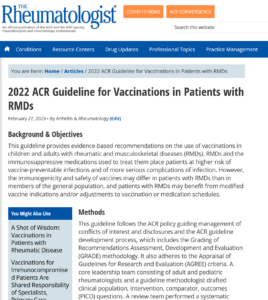 The ACR recently released its first guideline focused on vaccination in adult and pediatric patients with rheumatic and musculoskeletal diseases.1 The guideline recommends modifications to certain vaccine and medication schedules to increase immunogenicity and ensure patient safety, while encouraging providers not to miss vaccination opportunities.
The ACR recently released its first guideline focused on vaccination in adult and pediatric patients with rheumatic and musculoskeletal diseases.1 The guideline recommends modifications to certain vaccine and medication schedules to increase immunogenicity and ensure patient safety, while encouraging providers not to miss vaccination opportunities.
The Need
Patients with rheumatic conditions who are on immunosuppressive medications are at greater risk of vaccine-preventable infections and poor outcomes from infections than healthy individuals, making immunization a key protective action. Providers must weigh the risks of disease flare following medication withdrawal against the risks of poor immunogenic protection.
Anne R. Bass, MD, professor of clinical medicine at Weill Cornell Medicine and the Hospital for Special Surgery, New York City, and the guideline’s lead author, notes, “I think one of the goals of the guideline is that rheumatologists should be a little bit more proactive and take more ownership [of vaccination] because internists are not going to know the fine details of how to manage medications.”
Although rheumatologists may administer only a limited number of vaccines in their clinic, such as for influenza, Dr. Bass says she has become more involved in her patients’ vaccinations since many vaccines became available in pharmacies, at least in some states. And in some cases, patients see their rheumatologists more than any other medical provider.
The guideline repeatedly emphasizes the importance of getting vaccinations accomplished when opportunities arise. Karen B. Onel, MD, a professor of clinical pediatrics also at Weill Cornell Medicine and chief of pediatric rheumatology at the Hospital for Special Surgery, says, “Sometimes when people come to see us, we have to take the opportunity to vaccinate, even if it’s not perfect, especially for something like the seasonal flu.”

Dr. Onel
Note: This guideline does not contain recommendations on COVID-19 vaccines, currently provided elsewhere.2 Dr. Bass, who also served on the ACR COVID-19 Vaccine Task Force, explains the recommendations provided in the COVID vaccination guidance document differ somewhat; this is partly because building immunogenicity was so important in a population initially completely naive to the SARS-CoV-2 virus.
As with previous recent ACR guidelines, this one follows the GRADE methodology (Grading of Recommendations, Assessment, Development and Evaluation), including an evaluation of specific PICO questions (clinical population, intervention, comparator, outcomes) used to develop the strong or conditional recommendations. The following is a brief discussion of some of the key points discussed there in full.1
Non-Live Vaccines
With a few exceptions, the guideline conditionally recommends against holding immunosuppressive medications before or after non-live vaccinations. Dr. Bass points out that much of the data the guideline developers analyzed were indirect, and they leaned toward not holding medicines in the absence of clearer evidence.
An exception: The guideline contains a conditional recommendation to hold methotrexate for two weeks after influenza vaccination, if disease activity allows. This recommendation is based on two randomized controlled trials showing the negative impact of methotrexate on immunogenicity postinfluenza vaccination. This recommendation does not apply to other non-live vaccines.
Another exception: rituximab. For patients taking rituximab, non-live vaccinations should ideally be timed to be given at the time of the next scheduled rituximab dose, holding for at least two weeks thereafter. Dr. Bass points out that the negative impact of rituximab on vaccine immunogenicity became more evident from research related to COVID-19. However, because of the seasonal nature of influenza, a conditional recommendation is to give patients taking rituximab the influenza vaccine on schedule.

Dr. Bass
One other exception: glucocorticoids. The guideline conditionally recommends non-live vaccinations be deferred if the dosage is 20 mg daily or more. However, it’s also conditionally recommended that such patients receive the influenza vaccine on schedule.
Expanded Indications
The guideline also describes multiple scenarios for expanded vaccine indications. These include high-dose or adjuvanted influenza vaccine in patients with rheumatic diseases taking immunosuppressants. No important safety signals have been found for high-dose or adjuvanted vaccines, “so we felt that it was a good way to make sure patients get adequate responses to influenza vaccination even if they’re on immunosuppressive medication,” says Dr. Bass.
The guideline also spells out recommendations already made by the Centers for Disease Control and Prevention (CDC) for patients taking immunosuppressants: the pneumococcal vaccine, a strong recommendation for those younger than 65; the varicella zoster vaccine (VZV), a strong recommendation for those older than 18; and the human papillomavirus vaccine, a conditional recommendation for those between 25 and 45.3
“Our recommendations are really no different from those of the CDC for immunosuppressed persons who are under the general population age cutoff, so it’s really more a matter of emphasis,” says Dr. Bass.
Live Vaccines
Ideally live vaccines can be deferred while patients are on immunosuppressants, but this is not always possible in patients requiring long-term therapy. The guideline also contains recommendations for holding immunosuppressants before and after vaccination with live vaccines, which harbor the risk of vaccine-induced illness. For example, methotrexate may be held for four weeks before and four weeks after live vaccination.
Dr. Bass points out the evidence base for these specific periods in different agents is weak, and shorter hold times may be indicated in patients at risk of severe flare.
A key group to consider is very young children with severe autoinflammatory diseases or systemic juvenile idiopathic arthritis (JIA) taking interleukin (IL) 1 blockers, or similar treatment, who have not completed their primary vaccination schedule (e.g., with the live measles, mumps and rubella vaccine). “The risk of vaccine-induced illness is much greater with first exposure,” says Dr. Bass. “That’s a small population, but it’s an important one for rheumatologists because they are often the sickest kids.”
The guideline conditionally recommends that infants exposed to tumor necrosis factor (TNF) inhibitors in utero receive the live rotavirus vaccine within the first six months of life, in line with standard recommendations for infants. This contrasts with current recommendations from the American Academy of Pediatrics, which default to holding the vaccine for a year following exposure.

Click here to read an excerpt from an article on the guideline published by Arthritis & Rheumatology.
Dr. Bass notes that we do have some experience with children exposed to TNF inhibitors in utero who have not experienced clear adverse events, and TNF inhibitors are one of the only biologics that rheumatologists generally continue during pregnancy. “The pediatricians we collaborated with really were very happy with [this recommendation],” says Dr. Bass.
In contrast, for children of mothers who received rituximab during the second or third trimester of pregnancy, the conditional recommendation is to delay the first rotavirus vaccination until the baby is at least six months old, to promote better safety and immunogenicity.
Dr. Bass notes that rheumatologists seeing pregnant or pediatric patients should proactively discuss these topics, either with the parents or directly with the child’s pediatrician. As always, shared decision making and clear communication with patients are critical, especially because the evidence for many of these recommendations is weak.
Providers can play a key leadership role in helping their patients get the protection they need. “Pediatricians are really under siege with the anti-vaccination movement,” says Dr. Onel. “We need to be as supportive to them as we can.”
 Ruth Jessen Hickman, MD, is a graduate of the Indiana University School of Medicine. She is a freelance medical and science writer living in Bloomington, Ind.
Ruth Jessen Hickman, MD, is a graduate of the Indiana University School of Medicine. She is a freelance medical and science writer living in Bloomington, Ind.
References
- Bass AR, Chakravarty E, Akl EA, et al. 2022 American College of Rheumatology guideline for vaccinations in patients with rheumatic and musculoskeletal diseases. Arthritis Care Res (Hoboken). 2023 Jan 4.
- Curtis JR, Johnson SR, Anthony DD, et al. American College of Rheumatology guidance for COVID-19 vaccination in patients with rheumatic and musculoskeletal diseases: Version 5. Arthritis Rheumatol. 2023 Jan;75(1):E1–E16.
- Vaccine recommendations and guidelines of the ACIP. Altered immunocompetence. Centers for Disease Control and Prevention. 2023 Feb 10 (last updated). https://www.cdc.gov/vaccines/hcp/acip-recs/general-recs/immunocompetence.html.



